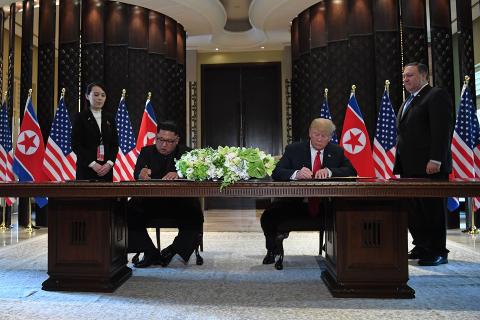The U.S. Wants North Korea to Get Rid of Its Nukes. But for Pyongyang, ‘Denuclearization’ Means Something Very Different
美国希望朝鲜放弃核武器。但对朝鲜来说,“无核化”意味非常
BY BILL POWELL
作者:比尔·鲍威尔
For a moment, the South Korean official was silent. It was late December, and, with negotiations between the United States and North Korea at a stalemate, I had asked a straightforward question: What, exactly, does the “denuclearization” of the Korean Peninsula mean? The matter is at the heart of the historic talks Donald Trump and Kim Jong Un began in Singapore last June. The South Korean official, a senior adviser to President Moon Jae-in, let out a deep sigh. “There is no consensus,” the official said, “not between us and the U.S., not between North Korea and the U.S.; not, frankly, even within our own government.”
韩国官员沉默了片刻。当时是12月下旬,随着美国和朝鲜之间的谈判陷入僵局,我提出了一个直截了当的问题:朝鲜半岛无核化究竟是什么意思?这个问题是去年6月唐纳德·特朗普和金正恩在新加坡开始的历史性会谈的核心。这位韩国官员是文在寅总统的高级顾问,他深深地叹了口气。“尚未达成共识,”这位官员表示,“我们和美国之间没有达成共识,朝鲜和美国之间没有达成共识;坦白讲,甚至我们政府内部也没有达成共识。”

That answer is the principal reason why the once-thawing relations between the two sides now seem to be getting colder. Trump, of course, had famously declared the nuclear crisis “largely solved” after last summer’s summit. But in November, as talks stalled, the North Koreans canceled a planned meeting between U.S. Secretary of State Mike Pompeo and the North’s chief nuclear negotiator, Kim Yong Chol. Just over a month later, on December 16, as the U.S. increased sanctions, Pyongyang’s Foreign Ministry fired a warning shot: The added economic pressure, it said, could be America’s “greatest miscalculation,” potentially blocking a deal “forever—a result desired by no one.”
这个答案是为什么双方一度缓和的关系现在似乎越来越冷的主要原因。当然,特朗普曾在去年夏天的峰会后宣布,核危机“基本上已经解决”。但去年11月,由于谈判陷入停滞,朝鲜取消了美国国务卿蓬佩奥与朝鲜首席核谈判代表金英哲原定的会晤。一个多月后的12月16日,随着美国加大对朝制裁力度,朝鲜外交部发出警告:报告说,经济压力增加可能是美国“最大的误判”,有可能“永远”阻止一项协议达成——这是任何人都不希望看到的结果。
To skeptics of the rapprochement that the president set after with typical fanfare, the diplomatic deadlock was all too predictable. The path toward denuclearization was always going to be vastly more complicated than the Trump administration has publicly acknowledged.
对于总统在典型宣传之后表示恢复邦交的怀疑者来说,外交僵局完全在意料之中。无核化道路总是比特朗普政府公开承认的要复杂得多。
Start with Washington’s opening position: The U.S. insists that the North must first comply with what it calls “complete, verifiable and irreversible dismantlement” of its nuclear program. That begins with a declaration of all the work the North has done on its nuke program, and all the material the nation has used in pursuing it. Then—and only then—would the North begin to see the benefits it seeks, including the end of economic sanctions, which could trigger huge investments from South Korea, China, Japan and the U.S., and a formal end to the Korean War, as well as diplomatic recognition from Washington. From Pyongyang’s perspective, these demands are not just unrealistic—they are ludicrous. “To North Korea, it’s a request that they unilaterally disarm before anything else happens, and that’s just not something that they can do,” says the South Korean presidential adviser.
从美国政府开放立场开始:美国坚持朝鲜必须首先遵守其所谓的“全面、可核查和不可逆转的拆除”核计划。首先声明朝鲜在核项目上所做的所有工作,以及这个国家为实现这一目标所使用的所有材料。只有到那时,朝鲜才会开始看到它所寻求的好处,包括结束经济制裁,这可能会吸引韩国、中国、日本和美国的巨额投资。朝鲜战争正式结束,并得到美国政府的外交承认。从朝鲜政府的角度来看,这些要求不仅不切实际,而且荒唐可笑。“对朝鲜来说,这是要求他们在其他事情发生之前单方面解除武装,而这不是他们能做的,”韩国总统顾问表示。
译文由可可原创,仅供学习交流使用,未经许可请勿转载。













